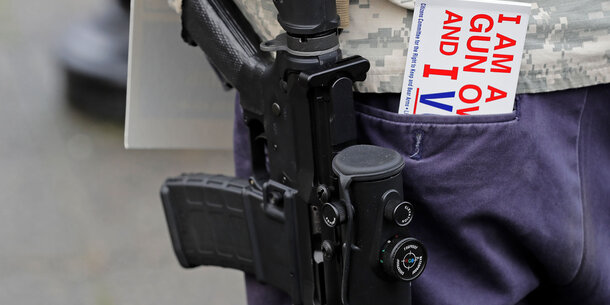You’re reading The Briefing, Michael Waldman’s weekly newsletter. Click here to receive it every week in your inbox.
Today, four days after the murders in Buffalo, above all we stand united in grief and anger and solidarity with the families and community that were attacked.
But this was a political crime. And it’s not wrong, not premature, to point to two intertwined political sicknesses that helped cause it.
One is the embrace of nakedly racist rhetoric by significant parts of our political system. The murderer drove hundreds of miles to target a store in a Black neighborhood, having been radicalized by the pernicious “great replacement” conspiracy theory. As has been widely discussed in recent days, this is not just something heard in fringe chat groups. It is espoused by the highest rated show on cable news, garbage spewed into the world by wealthy corporations and by leading politicians interested only in their own power. Ideas have consequences, words have consequences. White supremacist violence is the result — in Buffalo, in Charlottesville, in Pittsburgh, in Charlotte, in El Paso.
As Rep. Liz Cheney, the former House Republican Caucus chair, put it, “The House GOP leadership has enabled white nationalism, white supremacy, and anti-Semitism. History has taught us that what begins with words ends in far worse.”
The other political sickness is our broken political system’s inability to do something about the surge in gun violence and the profusion of weapons. There are now an estimated 400 million guns in the United States. The killer took advantage of porous laws and poor enforcement.
What happened in Buffalo showed the hollowness of the arguments by National Rifle Association lobbyists over the years. “The only way to stop a bad guy with a gun,” they claim, “is a good guy with a gun.” A childish analysis, yes, and also wrong. There was a good guy with a gun: the guard, heroic former Buffalo police officer Aaron Salter, who shot the murderer. But his bullets were deflected by body armor that is legal in all 50 states. Our laws have consequences.
As I wrote last week, the U.S. Supreme Court likely will soon strike down New York State’s century-old gun laws. Such a Second Amendment ruling would likely have a bigger impact than D.C. v. Heller, where the Court for the first time enshrined the notion that the Second Amendment protects individual gun ownership. More guns will mean more crime in crowded cities. As New York City Mayor Eric Adams pointed out yesterday, there are everyday massacres. Describing an 11-year-old girl killed in the Bronx, “pain is pain.”
These massacres can numb or they can clarify. They can depress us or remind us of what’s at stake. A quarter-century ago, the Oklahoma City Bombing shook the country and brought many to their senses. Will that happen today?
At moments like this, we must stand together as a community, with one another. We must unite against hate. We will fight for a more just vision for our country and our state, a vision of a vibrant multiracial democracy where we live in peace with one another, which must be our future.






